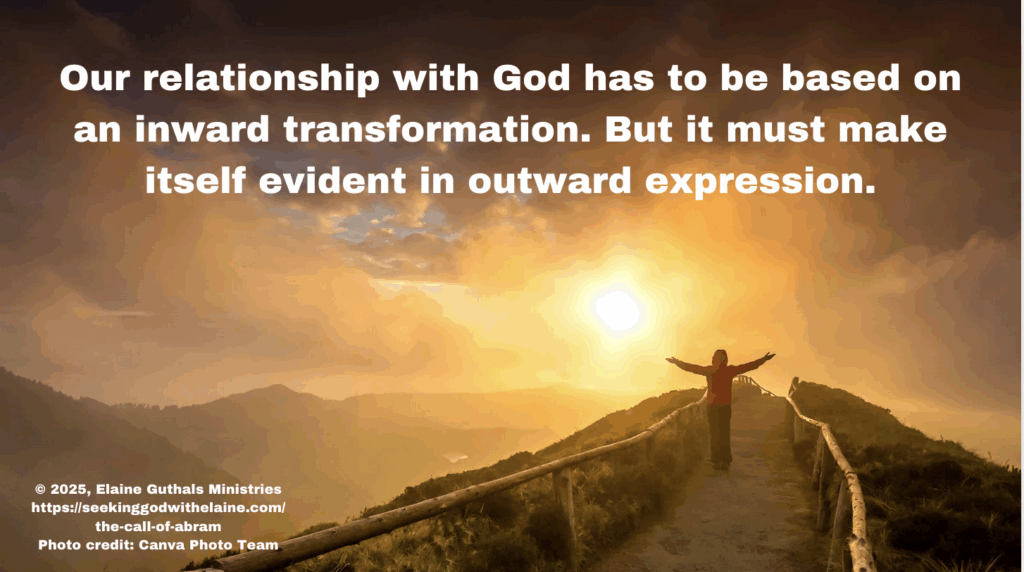When God called Abram, He established a covenant with him. This devotional reading looks at that call.
Nuggets
- God called Abram to follow Him into the unknown.
- Abram was making this journey on faith.
- Abram was going to be blessed by his descendants forming a nation as well as blessing others.

This is the passage we believe begins Abram’s story. We forget about Genesis 11: 31-32.
When Genesis 12 starts, Abram was not in Ur. He was in Haran.
Abram was living there because his father, Terah, had been heading to Canaan. He stopped in Haran — and died.
We pick up the story about five years after they got to Haran and right after Terah died. (The rest of the 28 chapters in Genesis are about Abram and his descendants.)
God’s call to Abram is also His first covenant with him. It was given with no strings attached and promised that his descendants would make a great nation, making his name great.
Program note: This went long, so I am saving one of the verses and the connections for the next devotion. Technology is sort of working tonight, but not fully. So bear with me.
Let's Put It into Context
To read devotions in the Creating Everything theme, click the button below.
Devotions in the Abraham the Emigrant series
Get Going
The Lord had said to Abram, ‘Leave your native country, your relatives, and your father’s family, and go to the land that I will show you” (Gen. 12: 1 NLT)
God called Abram to follow Him into the unknown.
It was with Abram the covenant that made the Israelites God’s people was established.
- Covenant established (Gen. 12: 1-3)
- Blessings of the covenant (Gen.13: 14-17)
- Sign of the covenant (Gen. 15: 1-21)
- Acceptance of the responsibilities of the covenant (Gen. 17: 1-27)
- Promise of the covenant (Gen. 18: 9-15).
Leave
After five years, God called Abram, making a covenant with him.
If God had talked to anyone between Noah and Abram, Moses didn’t tell us
that. I can see that. Noah may or may not have been the only righteous
one in his time. Abram was the next righteous man of note.
If we go with the biblestudy.org’s timetable, the year is 1885 BC. It has
been five years since Terah died. Verse 4 tells us Abram is now 75 years
old.
Resource
Abram was being called to start moving again. Verse 1 states that Abram was to “… ‘Go from your country and your kindred and your father’s house to the land that I will show you’” (Gen. 12: 1 ESV).
This was the first time that terminology was used. It was a call. It wasn’t persecution, famine, poverty, or wanderlust that got Abram moving.
It was God’s call.
Why would God tell Abram to “… ‘Go from your country and your kindred and your father’s house …” (Gen. 12: 1 NLT) if they weren’t in Ur?
Have you ever thought that it was strange that Terah stopped in a city named the same as his son? According to Altein, some think that Terah used to live in – and Abram was born in – Haran. We’ve seen others – Cain and Seth – who have named or possibly named cities after their sons.
Resource
At some point, they moved to Ur Kasdim and – five years ago – moved back. That could be the explanation for being called from his country.
But not all of Abram’s kindred moved to Haran from Ur. Nahor and Milcah stayed in Ur. Only Terah, Abram, Sarai, and Lot moved to Haran (Gen. 11: 31). All but Terah journeyed on with Abram.
Abram would have left his father’s household. According to the biblestudy.org, “Terah, after living in Haran for five years, dies at the age of 205.”
Resource
If Abram left Ur in 1890 BC at the age of 70, they would have had to get there within the year if Terah lived five years in Haron before he died and Abram was called to move in 1885 at 75 years old.
So, Terah may have set up a household in Haran from which Abram left. He had to if Abram was to leave some – and possibly never see them again – since everyone else who came from Ur left with Abram.
Doesn’t God have to get us off by ourselves sometimes so that He can grow us? We may not like the isolation, but it is the best for us sometimes. God has to separate us from others.
It was hard to move off the farm from my parents. It was hard to move out of state away from my Springfield mom.
God is still calling us to do just that. “If you love your father or mother more than you love me, you are not worthy of being mine; or if you love your son or daughter more than me, you are not worthy of being mine. If you refuse to take up your cross and follow me, you are not worthy of being mine. If you cling to your life, you will lose it; but if you give up your life for me, you will find it” (Mt. 10: 37-39 NLT).
Another possible explanation is that God included both trips – the trip from Ur to Haran and the trip from Haran to Canaan. That would have been
logical for two reasons.
The first reason is God often does things in steps. First, God separated Abram from his homeland of Canaan and any relatives that remained there. Then He separated him from his father.
The second reason is God would have included it to recognize Abram’s obedience. God will always recognize and reward obedience.

Do you think Abram should have just gone ahead and left after Terah died? He knew he was called to go. He didn’t know where.
But Abram didn’t just go. Just as Noah who waited until he was told to get on and off the ark, Abram was following God’s directions every step of the way.
How many of us would be obedient and go?
What does God’s call teach us?
- God is intimately involved in our lives.
- God rewards the faithful and obedient.
- The reward of eternal life is based on submission in this life.
To the Land that I Will Show You
Abram was making this journey on faith.
In the last devotion, we talked about whether Abram knew where he was going. There are contradictory verses.
- “One day Terah took his son Abram, his daughter-in-law Sarai (his son Abram’s wife), and his grandson Lot (his son Haran’s child) and moved away from Ur of the Chaldeans. He was headed for the land of Canaan, but they stopped at Haran and settled there” (Gen. 11: 31 NLT).
- “It was by faith that Abraham obeyed when God called him to leave home and go to another land that God would give him as his inheritance. He went without knowing where he was going. And even when he reached the land God promised him, he lived there by faith — for he was like a foreigner, living in tents” (Heb. 11: 8-9 NLT).
We figured – for Paul to have been correct – Moses dropped the destination in “after the fact.” God didn’t tell Abram – or even Terah – but Moses told us.
Look at it this way. The Promised Land has been described as one that was flowing with milk and honey. “Then the Lord said, “I have surely seen
the affliction of my people who are in Egypt and have heard their cry because of their taskmasters. I know their sufferings, and I have come down to deliver them out of the hand of the Egyptians and to bring them up out of that land to a good and broad land, a land flowing with milk and honey, to the place of the Canaanites, the Hittites, the Amorites, the Perizzites, the Hivites, and the Jebusites” (Ex. 8: 7-8 NLT).
God didn’t entice Abram to leave because He was offering this spectacular living place. The place could have been a desert for all Abram knew.
Abram had to put his faith and trust solely in God.
We don’t like it when God doesn’t tell us His plans for us. We want to know Plan A – and there better not be a need for Plans B C, and D.
We hear people say, “Don’t do anything until you are absolutely sure.” How do we get anything done that way?
If we are absolutely sure, we are not stepping out in faith. We are relying on ourselves to figure it out.
We aren’t relying on God. We aren’t letting Him guide us.
God calls us to put our trust in Him — in the big things and the little
things. Even when we have the blinding terror, we can trust in His plan.
Parker had a great reminder for us. He wrote, “God never calls men for the
purpose of making them less than they are, except when they have been
[dishonoring] themselves by sin. His calls are upward; towards fuller
life, purer light, sweeter joy.”
Resource
No, it usually doesn’t turn out exactly how we have planned. It turns out exactly as He has planned.
We have to do as Abram did – unconditionally trust God even when He doesn’t share the plan with us.
Gilfillan estimated that God was calling Abram to a 300-mile trip. That isn’t much these days, but it was then.
Resource
Think about this. This is the first time God promised to give Canaan to Abram and his family. Abram got to Canaan. He didn’t get to stay there very
long. Stay tuned for a couple of devotions from now.
A Great Nation
“I will make you into a great nation. I will bless you and make you famous, and you will be a blessing to others” (Gen. 12: 2 NLT)
Abram was going to be blessed by his descendants forming a nation as well as blessing others.
Right from the get-go, God told Abram that He was not only calling Abram but also calling his descendants. He was going to be the father of many.
The Jews put a lot of stock in being descendants of Abraham and being a great nation.
It wasn’t until the Israelites were called out of Egypt that they could be considered a nation of God’s people. That made them very proud of their
identify.
But this pride was also a blessing and a warning. The topical encyclopedia at biblehub.com talks about this. The topic explains one element of the pride of Israel. It wrote,
“On one hand, it represents the unique relationship between God and Israel, a nation set apart to reflect God’s glory and righteousness. This pride is rooted in the covenantal promises made to the patriarchs — Abraham, Isaac, and Jacob — and the subsequent establishment of Israel as a nation under God’s law. On the other hand, the pride of Israel often
becomes a source of downfall when it transforms into arrogance and self-reliance, leading the people away from their dependence on God.”
Resource
Part of that pride was shown in how the Israelites/Jews separated themselves from the world. Yes, even today, we are supposed to be in the word but not of the world.
Still, we have our marching orders.
- “And then he told them, ‘Go into all the world and preach the Good News to everyone’” (Mk. 16: 15 NLT).
- “Therefore, go and make disciples of all the nations, baptizing them in the name of the Father and the Son and the Holy Spirit. Teach these new disciples to obey all the commands I have given you. And be sure of this: I am with you always, even to the end of the age” (Mt. 28: 19-20 NLT).
- “… And you will be my witnesses, telling people about me everywhere—in Jerusalem, throughout Judea, in Samaria, and to the ends of the earth” (Ac. 1: 8 NLT).
Our relationship with God has to be based on an inward transformation. But it must make itself evident in outward expression.

Father God. You come to us individually to call us to be Your child. Lord, may we always obey You with faith and obedience as Abram had. Whatever You call us to do, we will do. Amen.
What do you think?
Leave me a comment below (about this or anything else) or head over to my Facebook group for some interactive discussion.
If you don’t understand something and would like further clarification, please contact me.
If you have not signed up for the email providing the link to the devotions and the newsletter, do so below.
If God has used this devotion to speak with you, consider sharing it on social media.